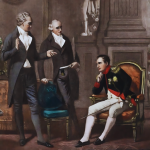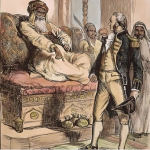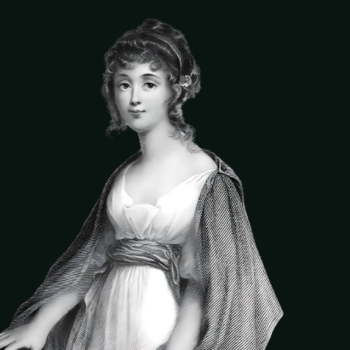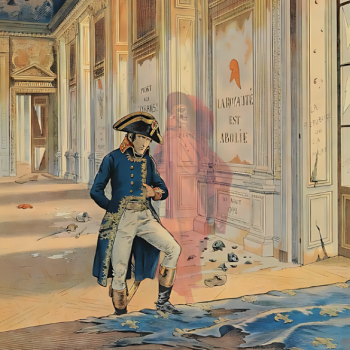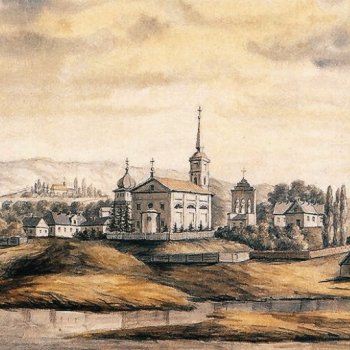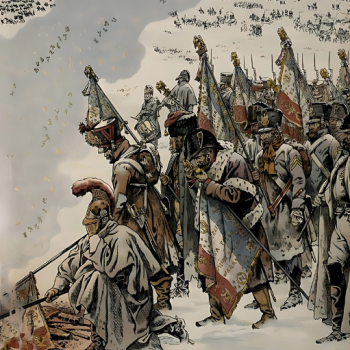A Tournament Of Shadows:
XVII. “No Time To Weep”
The evening of July 4, 1809, had closed dark and gloomy. Undaunted by the war of the elements, Napoleon, entrenched on the island of Lobau, put his army in motion and attacked the Austrians simultaneously at all points. The Austrians were taken by surprise, but they promptly responded. The French poured across the Danube all night long.
The following morning the storm had passed, and there was not a cloud to be seen in the sky. The light of the morning sun danced on the helmets and cuirasses of seventy thousand Frenchmen. The bridges were still crowded with horse infantry and artillery.
Archduke Charles rubbed his eyes on the neighboring heights of Wagram, surveying the spectacle. He had imagined that it would take at least a day for the French army to cross. He could not fathom all the dangers of his position. His brother Francis, Emperor of Austria, stood by his side.
“What think you of the situation?” asked the emperor.
“The French have indeed forced the Danube,” said the archduke, “and I am letting a portion of them pass over.”
“Very good,” rejoined the emperor. “But see that you do not let too many of them come over.”
Napoleon crossed in such a way as to take the Austrians in flank, thereby depriving them of the advantage of their entrenchments. All day long the hostile armies watched each other, each taking up its position on the field of Wagram. Skirmishes were frequent along the line, but the general engagement occurred the following day.
Darkness came. Napoleon could not sleep. Over the camp he rode, inspecting even the minutest of points. At midnight he summoned the Marshals to his tent and gave them instructions for the following day. The Austrians commenced the attack at daybreak. They had the advantage in the skirmishes the day before, and they continued to profit from that advantage from daylight until noon. The Austrians slowly gained on their enemy, besting the French everywhere except on their left. Far off in the distance, the multitudes packed into the towers and steeples of Vienna heard the cheers of their countrymen above the roar of the cannon. They cheered back in return, thinking that the victory had been won.
Oudinot had a command in the center with orders to carry the village of Wagram. Bernadotte, with his Saxon troops, was to assist him. In the first onslaught, however, the Saxons turned and fled from the field, leaving Oudinot to effectively carry on the fight single-handed. Though beaten back six times, Oudinot never lost courage, and on the seventh and last assault, his men swept the village and kept it in their possession.
Napoleon was everywhere on the field, rallying the disordered troops, and infusing fresh courage into them.
“Davout!” he ordered. “Make a circuit! Fall upon the enemy’s left wing at Neusiedel.”
He calmly awaited the result of this maneuver. Before long, Davout was seen sweeping over the plateau at Wagram. A moment later his cannon opened fire at Neusiedel. Napoleon, with a smile of satisfaction, turned round to Marshal Macdonald, whose steed was pawing restlessly at the ground by his side. “Take eight battalions and pierce their center!”
Macdonald had fallen into something of a temporary disgrace with Napoleon. A friend of Macdonald’s had been implicated in an assassination attempt on Napoleon’s life. Macdonald was one of those who refused to believe that his old comrade-in-arms could have descended to such depths. What fat of animosity remained was quickly melted away. The charge was magnificent. Macdonald and his battalions rode into the very teeth of the Austrian battery. The two hundred cannon brought to bear against them, ploughed awful gaps in their ranks. Still, they moved onward. Napoleon knew that the fate of his empire depended on that charge and looked on with eager interest. Several times he was heard to exclaim: “What a brave man!”
Macdonald forced his bloody way through the enemy for three miles. At last, he had almost reached the center. His battalions had melted away in front and on flanks before the fierce volleys of Austrian cannon. Of the sixteen thousand men of the charge, barely fifteen hundred remained.
Davout, meanwhile, had gained the tower of Neusiedel, had passed it, and soon the smoke of his cannon burst out on the plateau beyond.
“The battle is won!” cried Napoleon. “Bessières! Charge with the Old Guard!”
As Bessières put himself at the head of his men, a cannonball struck his steed. Horse and rider were hurled to the ground. Cries rose from the Old Guard.
“Let us go!” said Napoleon, averting his eyes from the scene. “I have no time to weep.”
(Luckily Bessières was only slightly wounded.)
When Macdonald saw the Old Guard in motion he knew, as Napoleon had known, that the victory was won.
“Forward!” Macdonald cried to his own broken ranks.
The next moment they pierced the Austrian center. The enemy fled in all directions. The Battle of Wagram was won.
Napoleon rode over the field after the victory where he saw Bessières. “Marshal,” said Napoleon, “the ball which struck you drew tears from all my Guard. Return thanks for that ball—it ought to be very dear for you!”
He then came across Macdonald. Napoleon stopped and offered his hand. “Shake hands, Macdonald. Let there be no more enmity between us. Henceforth we must be friends. As a pledge of my sincerity, I will send you the marshal’s staff, which you have so richly earned.”
Macdonald, his eyes dimmed with tears, caught Napoleon’s proffered hand.
“Ah! Sire,” he cried, enthusiastically, “with us, it is henceforth for life or death.”
Wagram brought the war of the Fifth Coalition to a triumphant close.
Following the battle, Bernadotte addressed the Saxon troops under his command. “Saxons!” said Bernadotte, “on the day of July 5, seven or eight-thousand of you pierced the center of the enemy’s army and reached Deutch Wagram despite all the efforts of forty thousand of the supported by sixty pieces of cannon; you continued the combat until midnight and bivouacked in the middle of the Austrian lines. At daybreak on the 6th you renewed the combat with the same perseverance, and in the midst of the ravages of the enemy’s your living columns remained immovable like brass.”
This proclamation made Napoleon livid. He a issued a counter order declaring that it was “contrary to truth, to policy, and to national honor,” and that “the corps of Prince of Ponte Corvo did not remain ‘immovable as brass,’ but was the first to beat a retreat.” This order was directed to be circulated among the marshals and ministers alone, so as not to distress the Saxon troops. Bernadotte left the army and returned to Paris.[1]
With the defeat at Wagram, the Austrian forces collapsed. When the casualties were added up, it was estimated that Austria lost over three million subjects, or twenty percent of her total population. Emperor Francis was forced to sue for peace. On October 14, 1809, the Treaty of Schönbrunn was signed, which imposed a heavy political toll on the Austrians. The lands of Carinthia and Carniola were given to the French, as well as the Adriatic ports (which removed Austria’s access to the Mediterranean.) West Galicia was given to the Duchy of Warsaw. The district of Tarnopol was ceded to Russia.
SOURCES:
[1] “Napoleon’s Marshals: V. Marshal MacDonald, Duke Of Tarentum.” The Illustrated American. Vol. VI, No. 57 (March 21, 1891): 241-244; “Napoleon’s Marshals: VI. Bernadotte, King Of Sweden.” The Illustrated American. Vol. VI, No. 58 (March 28, 1891): 297-301; “Napoleon’s Marshals: X. Oudinot, Duke Of Reggio.” The Illustrated American. Vol. VI, No. 62 (April 25, 1891): 497-499.


